Have you ever taken a trip to an amusement park? Then you are probably familiar with “amusement park dollars”. The park encouraging you to exchange your native currency to “amusement park” dollars because the only thing that is accepted in that amusement park is the currency of the amusement park. And of course, those amusement park dollars are not good anywhere else except in that park.
This is similar to how the public blockchain industry’s tokenomics works. If you want to play in the Solana ecosystem, you have to have the SOL token. Same with Cardano, where you need to pay using ADA. Theta is TFUEL, etc. The entire ecosystem model revolves around their specific currency.
And like amusement parks, every blockchain is in competition with each other. “We’re cheaper. We’re faster. We’re the easiest to develop on.” So on and so on…
In fact this “competition with each other” scenario has been seen throughout history. And it’s quite interesting to see, historically, who has been the winners in these types of competitions. VHS vs Beta in the 70’s, The desktop wars in the 80s, Ethernet vs Token Ring in the 90’s, search engine wars in the 2000’s, and the streaming war that is currently ongoing. And in almost all cases, the winners in these “wars” was the one who was collaborating rather than competing with others.
So the big question is….. Who is going to win the L1 public blockchain wars?
As mentioned above, the current state of the public “blockchain wars” is all about competing with everyone. The combination of every chain saying they are faster and cheaper, with the silo’ed tokenomic model of each chain forcing users to spend only in their currency locks every dApp in their own ecosystem. This is why interoperability has become one of the biggest topics in the industry.
But can we do it differently?
One of Partisia Blockchains core principles is interoperability. This is because our vision is to enable anyone to create solutions that help establish trust and foster collaboration and this means having an architecture that supports interoperability.
So in this regard Partisia Blockchain created a platform from scratch. And following the vision and principles we are adhering to, we created the concept of Bring Your Own Coin (BYOC).
BYOC basically means the users of the chain can pay for using apps developed on PBC using the coin they are most comfortable with. Or in other words, the gas payment on our chain is other liquid coins. This allows for the following possible features.
The Hermes bridge is a double-entry bookkeeping system securing the bridged asset through our MPC multi-sig oracle key. Currently supporting Ethereum, BNB and Polygon USDC, our roadmap includes others like bitcoin, ADA, XTZ and allows for simple integration to all other EVM compatible tokens. This interoperability and gas payment model opens up a variety of interesting use cases, such as the ability for users to interact with any dApp using their own currency of choice.
Our MPC-as-a-Service is also a unique feature of Partisia Blockchain. Our core vision is empowering anyone to be able to utilize our MPC services and to achieve this vision, we designed an architecture that allows anyone to call the blockchain, regardless of where their core app is built. Whether it is a traditional Web2 or a Web3 application that is built on a different chain, both can call Partisia Blockchain and compute using secret inputs without needing to port their entire application stack over to Partisia Blockchain.

By creating a programming language that allows for developers to use MPC in a generic way, and combining it with a unique interoperability and a scalability architecture, Partisia Blockchain Foundation has made the creation of applications that can harness the power of MPC for different use cases a possibility. Partisia has been at the forefront of providing private MPC solutions since 2008. And by layering this technology on top of an interoperable and scalable blockchain, Partisia Blockchain is now paving the way for anyone to create solutions that can balance privacy and transparency to build trust.
To learn more about different use cases or partner with us for solutions, please visit partisiablockchain.com, check out our Medium articles, development documentations or email us at build@partisiablockchain.com.
Guest blog by Vilma Catani and Radu Pavel, Co-founders of Monadi.
Monadi is a platform for managing sustainability data and reporting in compliance with the Corporate Sustainability Reporting Directive (CSRD). This EU-imposed regulation mandates companies to disclose information regarding their Environmental, Social, and Governance (ESG) impacts. With the CSRD set to come into effect in 2024, approximately 50,000 companies in the European Union will be obligated to report their ESG data. Monadi aims to simplify and streamline this process while also leveraging the business opportunities it presents.
Sustainability reporting requires management of a vast amount of data, which is a complex task. Firstly, sustainability data is often scattered throughout various departments and external sources within an organisation. Monadi aims to consolidate all of this data into a unified platform. Secondly, the timeline for achieving sustainability goals can extend for several decades, even as far as 2050. We want to be the go-to solution for managing both short-term and long-term sustainability goals.
Monadi has chosen Partisia Blockchain to help ensure safe, credible, and transparent management of data, enabling comparable results across organisations. Leveraging systems like Multi Party Computing and Zero-Knowledge proofs, Partisia Blockchain offers solutions for data transparency, credibility, and encryption. Given the sensitivity of sustainability data, many companies are reluctant to share it. However, the highly secure solutions offered by Partisia Blockchain provide a game-changing approach for ensuring data protection and privacy.
The Minimum Viable Product (MVP) is expected to be released by the end of this summer, offering the public access to the first use case: “Male-female pay gap” which adheres to the European Sustainability Reporting Standards and utilises Partisia’s Multi Party Computing (MPC) capabilities to privately collect and calculate the pay gap data between genders within the organisations, which is then added on-chain. The platform also provides dashboards and other features to monitor progress and generate reports ready for CSRD reporting.
In summary, Monadi is an innovative platform for management and reporting of sustainability data for companies operating under the CSRD. By leveraging Partisia Blockchain’s technologies and ensuring data privacy, Monadi offers a solution that simplifies compliance and empowers organisations to progress towards their sustainability goals.
— — — —
Website and social channels coming soon…
May was packed with exciting updates and announcements in the Partisia Blockchain ecosystem. We showcased our groundbreaking Random Number Generation (RNG) solution, highlighted impressive projects building on our platform, and launched Parti.com, an innovative launchpad for creators. We extend our thanks to the node operators and community members who participated in voting and congratulate Professor Ivan Damgård for receiving the prestigious Dijkstra Prize.
We also had the privilege of participating in the Cardano EMURGO × DoraHacks Hackathon, where we showcased the potential of MPC technology. Join us as we explore the latest tech updates and advancements in the Partisia Blockchain ecosystem and beyond.
This month, we have had several exciting updates and announcements within the Partisia Blockchain ecosystem. Firstly, we showcased Partisia Blockchain’s groundbreaking Random Number Generation (RNG) solution, which utilizes MPC and smart contracts to ensure secure and unbiased random number generation. With this solution, developers can achieve a high level of security and trust by eliminating biases and predictability.
Partisia Blockchain has also shone a spotlight on its vibrant ecosystem, featuring an array of impressive projects that have chosen to build on our platform. Kin, the Web3 ad-free search engine, disrupts the market with its community-driven approach and commitment to privacy. Blockchain-Ads fills a significant gap, enabling Web3 brands to reach their target audience effectively. eTrusty tackles corruption and enhances transparency in the procurement market. Thousand Faces supports female founders through a reward-based crowdfunding platform, addressing the gender gap in funding. Additionally, MetaNames, a decentralized Domain Name System (DNS), allows users to create human-readable domain names linked to Partisia addresses, smart contracts, social profiles, and IPFS content.
This month also marked the launch of Parti.com, the Insights Network’s innovative launchpad built on the Partisia Blockchain. Parti.com empowers creators by providing Web3 technology and cryptocurrency transactions for content monetization. The platform offers unprecedented control over creative output while enabling creators to earn revenue through self-hosted cryptocurrency. With an inclusive and user-friendly design, Parti.com ensures complete ownership and control of funds, accessible through a straightforward account setup process via Discord or Twitter login.
Next month, we are excited to continue our focus on highlighting our innovative solutions and showcasing the diverse projects thriving within the Partisia Blockchain ecosystem.
We want to extend our thanks to all the dedicated node operators and passionate community members who actively participated in the voting process on the proposals presented by the Partisia Blockchain Foundation’s Council. Your unwavering support is invaluable in shaping the future of Partisia Blockchain. Check out the voting result here.
We also want to give our warmest congratulations to Professor Ivan Damgård, Chief Cryptographer at Partisia, for receiving the prestigious 2023 Edsger W. Dijkstra Prize in Distributed Computing for the groundbreaking paper “Multiparty Unconditionally Secure Protocols,” co-authored by David Chaum and Claude Crepeau. Congratulations to Professor Ivan and the team on this well-deserved honor!
On 23 May 2023, we had the privilege to participate in the Cardano EMURGO × DoraHacks Hackathon, where Jesper Gravgaard, Partisia Blockchain Senior Manager, showcased the immense potential of MPC technology and how our blockchain-as-a-service can revolutionize the Cardano ecosystem. Jesper’s presentation highlighted the advantages of incorporating privacy into existing applications, emphasizing the benefits it brings. You can find the presentation on our YouTube Channel.
We are thrilled to witness the rapid growth of our ecosystem with the addition of new projects building on Partisia Blockchain. Our partners, including Ballotboxx and veric-io, have been making significant progress to contribute to the expansion of our chain. Stay tuned for more exciting ecosystem spotlights in the upcoming month as we continue to foster the growth and development of our vibrant community.
The development team was busy working on many new features in May. Alongside the changes needed for the token vesting change, we deployed:
In June, we will be working on additional functionality for the indexing tool for the browser, working toward bringing online the ETH price oracle in production, as well as moving forward with work on our decentralized exchange.
Website • Twitter • Discord • Telegram • LinkedIn • Facebook • Instagram • GitLab • Medium • YouTube
Guest blog by Dhruv Malik, Sr Smart Contract Engineer and Gael Bokongo CEO and Co-founder at Muwpay.
Muwpay, founded by an educated and innovation-driven team, is on a mission to dissolve the barriers of cross-chain universes by designing a flexible, interoperable user experience. The team has been developing their pioneering protocol called MUWP (Multi Underlying Wrapped Payment), a multi-token protocol adaptable to a variety of formats such as smart wallets, smart widgets, or SDK.
We are privileged to be trusted by Partisia Blockchain, one of the key players in the blockchain space known for secure and private computation services. This partnership has led to the creation of a smart wallet specific to the Partisia community. Thanks to the technical support and global vision of the Partisia Blockchain Foundation, a secure environment has been established where users can experience cutting-edge solutions. This collaborative approach holds vast potential for the future.
We were thrilled to be interviewed by the Partisia Blockchain team to explain our journey so far on our first partnership with such a significant figure in the blockchain industry. Check it out here.
Muwpay is developing the smart wallet and cross-DEXliquidity aggregator protocol with the aim of:
Thus, we provide full end-to-end wallet as a service for Partisia ecosystem
This will be the cross-native wallet that works as follows:
And then see the benefits of paying instantaneously in stablecoins using multiple denominations and low slippage.
For us, Partisia Blockchain ecosystem’s main characteristics were critical to launching our project on this ecosystem, services such as:
MUWP offers extensive benefits for crypto holders. It streamlines the conversion of tokens, reduces operational risks through secure and private computation services, and decreases gas fees by enabling any token for payment. The shards feature also improves transaction throughput. As such, MUWP enhances the overall cryptocurrency user experience, taking it a notch higher.
Thus, we have been progressing to build the smart contract protocol layer and also the mobile wallet, and are poised to release the beta test version around July. Feel free to follow the website muwpay.com for more information.
Overall, the partnership between Muwpay and Partisia Blockchain, and the innovations they are set to introduce, demonstrates a clear vision for a more efficient, secure, and user-friendly future in the world of blockchain technology.
Guest blog by Parker Duncan and Giorgio Guidett, MetaNames Co-Founders.
MetaNames is a decentralized Domain Name System (DNS) built on top of the Partisia blockchain. MetaNames enables users to create human-readable domain names that are linked to Partisia addresses, smart contracts, user socials and IPFS content.
MetaNames simplifies the process of interacting with the blockchain. Instead of using long, complex hexadecimal addresses for transactions, MetaNames allows users to use short and easily recognizable domain names, just like traditional domain names on the internet.
The key benefits of MetaNames include:
Moreover, MetaNames brings fresh air to the NS ecosystem by leveraging Partisia features such as privacy-preserving contracts and BYOC logic:
Check out our roadmap below:
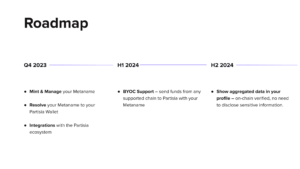
MetaNames aims not just to provide a base and core chain infrastructure but to fully leverage Partisia Blockchain’s innovative technology to improve the current NS industry.
Stay tuned for more, and keep up to date with us by following our Twitter!
Guest blog from Moojan Asghari, Thousand Faces Co-founder and CEO
Thousand Faces is a reward-based crowdfunding platform powered by Partisia Blockchain. It aims to address funding gaps and support impact-driven female founders. With only 1.9% of venture capital funding allocated to all-female founding teams, there is a huge gender gap in funding.
While women currently make just 30% of climate-related decisions, they have proven to excel in building sustainable businesses, resulting in organizations led by women being 2.5 times more profitable. Recognizing the significance of funding more women and providing them with leadership opportunities, Thousand Faces seeks to democratize funding for women and minorities by offering both financial resources and a powerful network.
Driven by the frustration of limited funding and support for underrepresented groups, we embarked on a mission to leverage the principles of Web3, namely transparency, ownership, and decentralization, to serve both people and the planet. The lack of inclusivity in investment decisions, particularly regarding women and minority-led ventures, poses a significant challenge. Research shows that unconscious bias often leads investors to favor individuals who resemble themselves, perpetuating the underfunding of women and minorities. To address this issue, Thousand Faces turned to the powerful capabilities of Partisia Blockchain.
Partisia Blockchain introduces an innovative approach to tackle this problem through its zero-knowledge and voting mechanisms. Leveraging the secure content and zero-knowledge voting developed by Partisia Blockchain, Thousand Faces is building a decentralized autonomous organization (DAO). This empowers the creation of an inclusive and transparent voting system that ensures the active participation of a diverse community.
The voting system operates at two levels. Firstly, a diverse jury panel plays a crucial role in the initial voting stage, utilizing the zero-knowledge bootstrapping of Partisia Blockchain to ensure process security. Additionally, a committee-based second level of voting includes the entire community, consisting of token holders and NFT members. This approach guarantees that community members, who act as funders and supporters, have a voice in selecting projects and monitoring their progress.
Thousand Faces has already launched its first membership and NFT collection, available on the website for interested individuals to explore and apply for private sales. You can apply to join the Thousand Faces membership on the allowlist here. The platform has also established a dedicated member’s board and successfully completed its inaugural acceleration program for female founders. We received over 200 applications from nearly 80 countries, aligning with diverse UN Sustainable Development Goals (SDGs). From Kenya, Nigeria, Germany, Lebanon, Singapore, and the UK, six outstanding projects reached the final round. At the awards ceremony in April, the top three were granted US$30,000, with support from sponsors including Sandbox and the World of Women Foundation.
To stay updated on our latest developments and join us on our exciting journey, follow us on Twitter or visit our website. We’re excited to be part of the Partisia Blockchain ecosystem and are fully committed to transforming the inclusivity in the web3 space and beyond.
Website | Twitter | Linkedin | Telegram | Discord | Medium | Instagram
Guest blog from Mariia Kren, eTrusty Co-founder and CEO
Corruption represents a significant hindrance to both economic growth and human development. Among various processes, procurement is particularly susceptible to corrupt practices, leading to substantial financial losses estimated at around €400 billion per year in European public procurement.
Furthermore, the procurement market faces another challenge as it is expected to grow from US$12–US$13 trillion in the next five years to approximately US$16–US$19 trillion. As procurement costs rise, the need for tender sites to scale rapidly becomes increasingly important.
In our commitment to combat corruption, restore trust in procurement, and facilitate the scalability of procurement platforms, we are delighted to introduce eTrusty.
By implementing blockchain technology, eTrusty fosters transparency through a publicly accessible ledger, ensuring secure and transparent monitoring of transactions and information. Moreover, it provides a decentralized and immutable data state, ensuring the secure storage of data. These features effectively mitigate client distrust and significantly reduce the risks associated with technical fraud.
A pivotal aspect of our confidence in implementing eTrusty lies in our collaboration with Partisia Blockchain. By harnessing the power of Multiparty Computation (MPC) with Zero-Knowledge (ZK), eTrusty establishes customizable layers of privacy for various aspects of procurement, such as applicants, judges, and results. This robust privacy framework effectively combats human fraud, coercive practices, and bribery. To elevate the scalability of eTrusty, we have integrated Partisia’s groundbreaking solution, Bring Your Own Coin, to establish a cross-border solution. Furthermore, the architecture of eTrusty enables customization to cater to diverse procurement requirements.
Currently, we are diligently developing our smart contracts, user interface, and back-end prototype. Our Minimum Viable Product (MVP) is scheduled to be completed in the last quarter of 2023. This MVP will be a web application showcasing all the key features of our API, which we plan to seamlessly integrate into existing tender platforms in the future.
The mission undertaken by eTrusty is of utmost importance and highly relevant in the current business landscape, where accountability and transparency are increasingly demanded. We eagerly anticipate the continued evolution of eTrusty’s protocol and its meaningful contribution to the broader objective of cultivating a fairer and more sustainable global economy.
As proud members of the Partisia Blockchain ecosystem, we invite you to follow us on our journey to shape the future of procurement!
15 May 2023 — Today marks the launch of the Insights Network’s Parti.com, a unique platform that empowers creators with Web3 technology and cryptocurrency transactions for content monetization. This hub for creators provides unprecedented control over their creative output, while enabling them to earn revenue through self-hosted cryptocurrency. Parti.com is built on the open-source technology of Partisia Blockchain, renowned as the world’s first privacy-preserving, next-generation blockchain. It offers multi-network currency support and affordable transactions.
Parti.com, designed to be an inclusive platform, provides users with self-custody of their funds, ensuring complete ownership and control. The platform’s ease of use, facilitated by a straightforward account setup process via Discord or Twitter login, makes it accessible to both creators and consumers.
Parti.com simplifies the buying and selling process by completely removing third parties, such as traditional banks and other Web2 financial institutions, from the monetization process. This marks the first time that creators and content consumers can interact within a completely peer-to-peer network, without payment processors or middlemen holding user funds.
One of the key features of Parti.com is the ability to create and sell NFTs directly from creator profiles, simplifying the process of content monetization. The AI Zone helps new creators generate art rapidly; thereby, democratizing the digital art landscape.
Furthermore, Parti.com breaks new ground with its application of NFTs as utility tokens, granting access to exclusive content. This concept, known as “tokengating”, is set to change the way creators engage with their audiences, fostering deep, meaningful connections. An easy-to-understand use case could involve a content creator creating a pass with a maximum of 1,000 units sold. All holders of this NFT, upon signing into their platform with their wallet, are granted access to all of the creator’s private content available on their Parti.com channel. This process, completely automated by the blockchain, creates a direct, creator-to-user connection that surpasses anything the current market offers, be it Web2 or Web3. The platform also accommodates transactions with ETH in Metamask, providing users with the flexibility to transact in their preferred cryptocurrency.
To jumpstart the network, Parti.com offers the unique “Hall of Fame” (HOF) NFT pass. This limited NFT access pass grants users master access to the entire network, enabling the first users to buy into the entire network and never have to pay for content access again. Coupled with the platform’s low transaction fees, this feature is set to redefine the value proposition for content creators and consumers. In the future, if users wish to leave the network, they can always offer the pass for sale in the upcoming NFT marketplace.
Parti tokens function as the platform’s currency, which users can use for buying and selling. Creators incur a 0.1% platform fee when selling NFTs or content in Parti tokens, compared to a 5% fee when using ETH or USDC. Although this fee model is subject to change, there is currently no fee for creators for at least the next three months, serving as an incentive to join the network early.
In essence, Parti.com is more than just a platform — it is a revolution in the creator economy. It is dedicated to providing creators with the tools they need to thrive, while offering consumers a new way to interact with and support their favorite creators. As the digital landscape continues to evolve, Parti.com stands at the forefront, poised to transform the creator economy with the power of Web3.
About Parti.com: Parti.com is built by Insights Network, a web3 Company founded in 2017 and through multiple market cycles.
About Partisia Blockchain Foundation: Partisia Blockchain Foundation brings unparalleled opportunities by empowering privacy-preserving, interoperable and sustainable innovation for fairness and transparency. It fuels the most secure and efficient networks to solve global problems. Distilled with more than 30 years of rigorous research, Partisia™ Blockchain future-proofs solutions, solves tomorrow’s challenges by powering fair, secure, distribution of benefits. While preserving privacy and confidentiality, it brings accountable, transparent and decentralized governance. Learn more: www.PartisiaBlockchain.com
Website • Twitter • Discord • Telegram • LinkedIn • Facebook • Instagram • GitLab • Medium • YouTube
Guest blog from Vlad Chejkov, Blockchain-Ads Founder
As the founder of Blockchain-Ads, I am thrilled to be featured in the Ecosystem Spotlight, where we are shedding light on the revolutionary changes we are bringing to the Web3 industry.
Blockchain-Ads is specifically designed to bridge a gap in the market where Web3 brands struggle to reach their ideal customers. Traditional ad networks often restrict crypto-related promotions, and none of the crypto ad networks currently allow targeting based on users’ on-chain behaviour.
Blockchain-Ads platform offers Web3 brands the opportunity to connect with their target audiences efficiently and effectively, outperforming the competitors 10 to 1.
Our collaboration with Partisia Blockchain has been fundamental to our success. Their pioneering multiparty computation (MPC) and zero-knowledge (ZK) technologies serve as the backbone of our solution. They ensure user data is processed securely while facilitating targeted advertising. This approach respects user privacy and transforms the digital advertising landscape without revealing any underlying data or compromising user privacy.
Currently, we are at an exciting juncture. We are preparing to launch Partisia smart contracts on testnet in the first half of May. It is a crucial step that will help us refine our solution in a secure environment before launching on the mainnet.
As we forge ahead, our mission is clear: to disrupt the conventional, centralized advertising industry with a decentralized, privacy-preserving, and cost-effective solution. We aim to redefine privacy and user control in the digital advertising landscape, tailoring specifically to the needs of Web3 brands.
For more insights into our progress and to stay abreast of our exciting journey, follow us on Twitter or reach out through our website. We are proud to be part of the innovative Partisia Blockchain ecosystem and look forward to reshaping the future of privacy-preserving advertising in the Web3 space.
Guest blog from Gordon Povey CEO & Founder at Kin
Kin is a Web3 ad-free search engine built around community, transparency, and privacy. The prototype has been operational for over a year and on 1 May 2023 we launched the Kin beta https://searchkin.com.
Our aim is to be a disruptor and so we are highly differentiated from incumbent search engines like Google.
We are building a community of users that believe in Web3 principles. We use blockchain and a smart contract for transparency. We will use multiparty computation (MPC) technology to ensure maximum privacy for users at all times.
We have thrown out the traditional advertising business model where the user is the product to be sold to advertisers. Instead, we become a broker of both information and also online products.
So metaphorically, if you want to go to the library for information, we become your personal librarian and try to find exactly what you are looking for without trying to sell you anything or distract you along the way. Then, if you do want to go to the shopping mall (metaphorically) to buy something, we are like your personal shopper trying to find exactly what you want and can even uncover local or artisan products that are usually difficult to find online.
We generate revenue as a broker only when we find what you really want. By taking this approach, we find information that is less skewed by large commercial SEO budgets, and we can discover online products that are often hidden by advertising and brand dominance.
We knew we needed to work with a Layer 1 blockchain so that we could mint our own tokens. We also knew that we needed a secure way to process user data while maintaining complete privacy. The fact that Partisia Blockchain was offering not just a blockchain, but also MPC capabilities made it a front runner.
We have just launched the Kin beta. The organic search (for web, news, images and videos) is working extremely well. We believe it provides better results than the incumbent search engines (try it for yourself and compare our results to other search engines).
We still have work to do on the shopping searches, which are limited and UK-centric at present. We will also be turning on the user rewards system very soon. To fund future developments, we are opening another token pre-sale, which will allow early supporters of our project to buy tokens at a discounted price. The funds will be used for the product launch and marketing, and for ongoing developments such as the implementation of our community-based training (using xAI methods) which is included in a patent we recently had granted.
Learn more about us: Search engine, Website, Email, Telegram, Twitter, LinkedIn
Most may not know, but generating random numbers is hard. It is quite surprising because many people will think, “well, I can just come up with a random number off the top of my head!” However, randomly coming up with a number in your head, as well as other solutions to generate random numbers has fundamental flaws. And this is a big problem. Generating a fair unbiased random number is critical. In fact, random number generators are used everywhere.
The first place many would think of random numbers being useful is in games of chance. But would you be surprised if you knew that reading this article required the use of a random number generator? The website hosting this article is protected by a cryptographic key, which relies on generating a random set of values to be used for the encryption key.
Generating numbers at random is difficult. At a high level, there are two main issues with generating random numbers: predictability and bias/corruption issues.

The predictability issue for RNG can be seen in both human- and machine-generated random numbers. For example, there is a famous problem called Benford’s Law that states any random number that someone thinks about has a 30% chance of starting with the number 1. When you want to have a chance of a number being generated to be equal in percentage, then this becomes a problem. If you use a computer program to generate random numbers, you are using a structured code. This means, after multiple iterations, someone can reverse engineer the numbers to find the pattern and predict what the next number could be, especially if the code being used is weak.
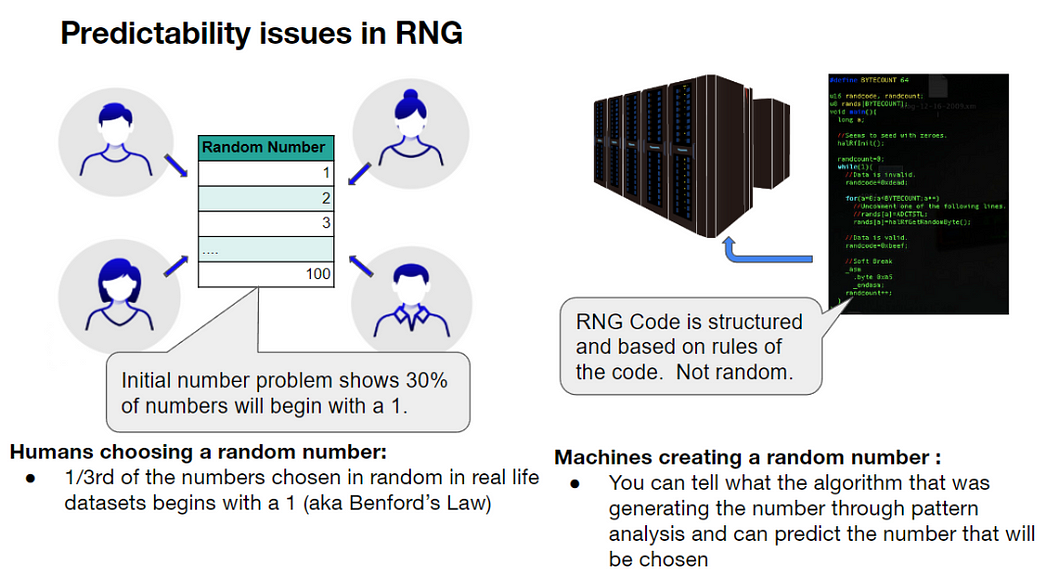
From a bias and corruption perspective, the current systems can also be gamed to give favor to someone. For instance, if a set group of people decide they will choose random numbers and run through some function to compute a random number, one person may withhold showing their number until they see what the other people have chosen. Then, once he knows the numbers of the other participants, he can choose a number that would compute the random number to his favor. From a machine generated random numbers, since most systems have a central system that is generating the numbers, anyone who has control of that system could also manipulate the numbers being generated to their favor.

So how can we create a system where it is both unpredictable and bias free? Through MPC and Partisia Blockchain, we can solve both problems. Through smart contracts, players in the system generate a random number. This random number is then privatized and sent into the PBC blockchain. A zero-knowledge computation is done, in a similar way as done through secret sharing and through a computation, a random number is revealed.

Through combining multiple players and secret sharing, developers can create a system to come up with a random number that is free from bias, incorruptible and impossible to predict. And Partisia Blockchain’s smart contract language will afford developers to customize this solution to their specific requirements.
By creating a programming language that allows for developers to use MPC in a generic way, Partisia Blockchain Foundation has made the creation of applications that can harness the power of MPC for different use cases a possibility. Partisia has been at the forefront of providing private MPC solutions since 2008. And by layering this technology on top of an interoperable and scalable blockchain, Partisia Blockchain is now paving the way for anyone to create solutions that can balance privacy and transparency to build trust.
To learn more about different use cases or partner with us for solutions, please visit partisiablockchain.com, check out our Medium articles, development documentations or email us at build@partisiablockchain.com.
In April 2023, Partisia Blockchain had an eventful month with exciting updates and developments. We welcomed Bakyt Azimkanov as the new Head of Communications, signaling a commitment to expanding its reach and global presence. The Spotlight Solutions campaign continued to showcase our MPC technology capabilities in enhancing security and trust in the blockchain industry. Partisia Hivemind Huddles was launched, providing a space for the community and team to discuss a variety of topics and encourage collaboration. And we distributed the third quarter staking rewards. Finally, we also shared several tech updates, including the launch of the ETH price oracle on testnet and the enabling of multiple inputs in an MPC contract, among other updates.
Last month, we were thrilled to share some exciting organizational highlights. Partisia Blockchain Foundation recently welcomed Bakyt Azimkanov as our new Head of Communications, marking a significant addition to our leadership team. Bakyt is an accomplished professional with years of experience in strategic communications, branding, and press outreach programs across blockchain, financial services, and technology. Before joining us, he served as the Head of Communications at the Cardano Foundation. In his new role, he will oversee the development and implementation of a comprehensive communication strategy aimed at increasing awareness and driving adoption of our blockchain technology with cutting-edge multiparty computation capabilities.
We were delighted to have Bakyt, along with another excellent addition to Tiago Serôdio, Head of Community, attend Consensus 2023 in Austin, Texas, to represent Partisia Blockchain. Our team was thrilled to meet new and old friends in the community and engage in fruitful discussions about the future of blockchain technology. We had a great time networking and learning about the latest trends and innovations in the industry and were delighted to see so much enthusiasm for our MPC blockchain technology. If you missed us at the event, please reach out to us and let’s connect. We look forward to seeing you at the next blockchain event.
Throughout April, we continued to highlight our Solutions Spotlight campaign, including Secret Surveys, Preventing Front Running, Privatized Settlement Layers, and Data Sharing showcasing how Partisia Blockchain’s MPC technology can enhance security and trust in the blockchain industry. Our Head of Community, Tiago Serôdio, and Head of Developer Relations, Bruce Ahn, led a series of Spotlight AMAs and Q&As to educate our community on how our MPC technology can solve real world problems.
Last month, we were thrilled to launch Partisia Hivemind Huddles! Our inaugural monthly Hivemind Huddle took place on Friday, 21 April 2023, providing a space for our community and team to come together and discuss a variety of topics, while encouraging everyone to participate with their ideas and thoughts. This informal and welcoming forum is designed to promote open communication and collaboration. For the first session, we focused on answering recent questions from our community through an AMA format. For those who could not attend, we will hold a second session that will recap the first session and address any follow-up questions. Stay tuned for updates on the next Hivemind Huddle, and mark your calendars to join us for lively discussions and brainstorming sessions.
Our ecosystem is growing! Our partners have been working hard and making progress building on our chain. Our sales team also has been busy and are working through more than 40 new leads and prospects. We have also seen higher interest in our blockchain and, as a result, have received multiple pitch ideas and we are busy working to get them onboarded and begin development. Please be on the lookout for our ecosystem spotlight in May for more details.
Third quarter rewards distributed. We have distributed our bootstrapping rewards for the third distribution quarter (December 2022 — February 2023). This is also our first distribution for our community stakers and more than 650,000 MPC tokens were distributed. Even better, we expect our next quarter rewards to be over one million! So, if you have not staked your tokens, please read this guide and put your tokens to work.
Website • Twitter • Discord • Telegram • LinkedIn • Facebook • Instagram • GitLab • Medium • YouTube
Trust is the basis for any relationship. Whether it is between you and your friends, or between one company working with another, even with governments sharing information with each other. Without trust, society cannot exist. Every type of a relationship requires some type of trust that is built through time.
But what is trust? And how does one go about establishing it with another entity? Trust is earned through a give-and-take between parties and demonstrated pattern of reliability. It is also relative, as everyone has a different level of risk appetite. A balance that is relative to the amount of risk the person is willing to take against the amount of reliability the other party has demonstrated in the past.
So how does this balance take place?
Clearly, if no one is willing to share or demonstrate anything about themselves, trust cannot be established. There has to be some level of vulnerability to even begin the initial stages of establishing trust. But at the same time, complete and full transparency also does not help establish trust. And this is because almost all relationships start off mutually distrustful. Trust is something earned. If given to someone arbitrary, that person could use that trust against you.
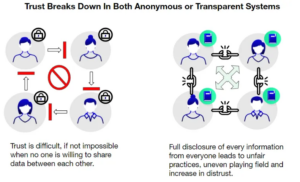
And in a way this balance of privacy and transparency to establish trust has been tipped in favor of one side to another throughout history. How many times have you or someone you know been burned by giving trust to someone who–knowingly or unknowingly–betrayed it? How many deals are broken between companies? How many government secrets have been compromised through leaks? Building trust is a gradual process, where one party shares something in hopes that the other party shares something of equal value.
But what if there was a way to share information without sharing information?
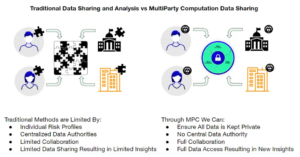
As we reviewed in other articles, multiparty computation allows for the computing of data even if the owner does not share the details around it. And in the example of sharing of data, this means any mutually distrustful parties can collectively allow the use of their data without sharing the details of data itself.
What does this mean in practice? At a high level, this means you can now reduce the weight of risk in the balance of establishing trust. Because you no longer have to expose your private data, the risk of that data being used against you is lowered. And this means you no longer require the same heavy weight for demonstrated reliability that you would need on the other side of the trust scale.
This is a game changer on many levels. Trust is the fundamental basis for any relationships between entities. With MPC, we now have the opportunity to change how this can be played.
In the example below, let’s say we have two financial companies that are competitors. They have a lot of secrets they would like to keep internal, but they do business with each other as a part of their overall practice. As a result of their business, there are many mutual clients. If there was a suspicious activity in one of their clients, having a single set of data they can analyze may not be enough. But what if both companies could share the use of their data together for forensic analysis without sharing the details of the data itself? This may lead to a far more comprehensive analysis.
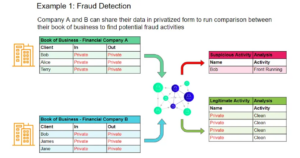
Another example is where multiple companies need to validate meeting of certain regulatory or compliance goals. But to compute the data, it requires exposing private information. Through MPC and Partisia Blockchain, a company will be able to validate meeting regulatory goals without exposing their data to the public.
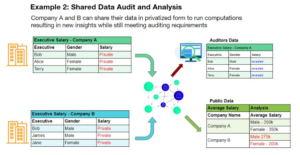
These are very simple examples of how companies can still work together without revealing their private data. And we have quite a variety of projects building on Partisia Blockchain that takes advantage of this new way of doing business.
CyberPeace Institute is working with Partisia Blockchain to help NGOs combat the issue of malware and ransomware by allowing NGOs to privately work with other parties who may be facing similar attacks. This allows NGOs to work together with others without reputation impact or exposing information that may create other vulnerabilities in their system.
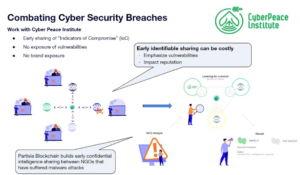
Monadi is working on helping companies comply with CSRD regulations that will impact over 50,000 companies in the EU. By 2025, companies will need to validate that they are meeting certain SDG goals, with the first goal being able to certify that there is no gender pay gap in their executives’ compensations. As the regulation matures, Monadi will be in a good position to help companies certify other SDG requirements without the need for the company to expose private data.
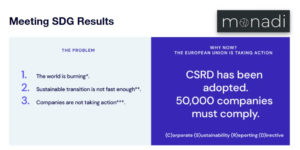
With a growing number of partners and integrators looking to solve the issue of trust, Partisia Blockchain is well positioned to help provide the solutions we need–whether it is to address the transparency in blockchains or to solve existing problems outside the blockchain space.
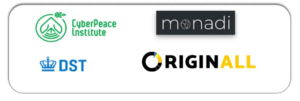
For additional insights on this use case, come and watch our Q&A session we did on this topic.
By creating a programming language that allows for developers to use MPC in a generic way, Partisia Blockchain Foundation has made the creation of applications that can harness the power of MPC for different use cases a possibility. Partisia has been at the forefront of providing private MPC solutions since 2008. And by layering this technology on top of an interoperable and scalable blockchain, Partisia Blockchain is now paving the way for anyone to create solutions that can balance privacy and transparency to build trust.
To learn more about different use cases or partner with us for solutions, please visit partisiablockchain.com, check out our Medium articles, development documentations or email us at build@partisiablockchain.com.
Ledgers are the primary ways settlements are recorded. The first double bookkeeping ledger system was recorded in use as far back as the 1300s. It is still the de-facto system used today to record transactions between entities.
Fast forward to 2008. Satoshi Nakamoto (pseudonym) was frustrated with the corruption due to the lack of transparency and centralized control of the traditional system. He proposed a transparent distributed ledger system that was immutable as a system of recording transactions. Thus Bitcoin was born.
But with all new systems, there is always room for improvements.
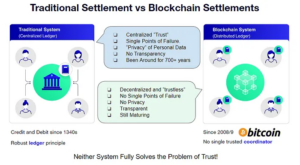
As discussed in our previous articles, full transparency does not solve the problem of building trust. In fact, privacy is a requirement in any trust relationship. For example, nobody would trust a credit card provider that revealed every purchase cardholders made just by someone having their credit card number. In a traditional blockchain space, every transaction is written in a public ledger. It would only require matching a wallet address to a name to see the full history of their transactions.
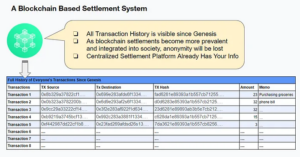
How can you have a blockchain that privatizes transactions and has enough flexibility to analyze and compute the data? Through integrating a proven technology into a scalable and interoperable blockchain.
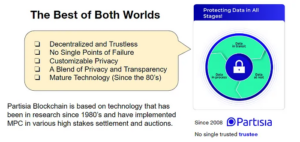
Developers can pick and choose which part of the data in the blockchain needs to be private and which can be public. All thanks to the Partisia Blockchain’s programmable MPC. A layer of governance can be enabled around the private data to allow for computation and access to select individuals. Those who access the data can also be audited transparently.
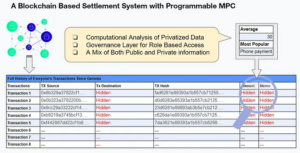
Now, even if someone has your credit card details, they will not be able to see your purchase history and your spending. If needed, a governance model can be created to ensure auditability and traceability to the system.
The importance is evident in our partnership with the International Committee of the Red Cross (ICRC). We partnered with the ICRC to build out a program for distributing aid through blockchain. One of their key requirements was privacy of the aid recipients. As they are a very unique organization, one of their key principles is in confidentiality and bilateral dialogue. The ICRC mainly operates in conflict zones and lack of privacy can mean life or death.
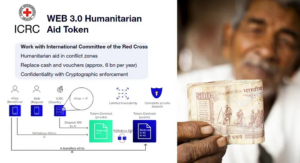
ICRC was able to solve their key challenge of privatizing the transactions of the stable tokens in the ecosystem thanks to Partisia Blockchain’s MPC. As shown above, the deposit of the funds from ICRC is kept private. As a result, transfers between the users are anonymous. To learn more, please watch our video of the overview of the solution here.
As blockchains become more prevalent, the need for privacy will continue to grow and take center stage. Various projects are already being built with private settlements in mind. We continue to speak with many organizations who prioritize the need for privacy in a blockchain solution.
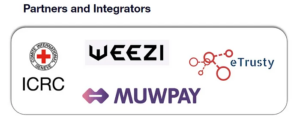
For additional insights on this use case, come and watch our Q&A session we did on this topic.
By creating a programming language that allows for developers to use MPC in a generic way, Partisia Blockchain Foundation has made the creation of applications that can harness the power of MPC for different use cases a possibility. Partisia has been at the forefront of providing private MPC solutions since 2008. And by layering this technology on top of an interoperable and scalable blockchain, Partisia Blockchain is now paving the way for anyone to create solutions that can balance privacy and transparency to build trust.
To learn more about different use cases or partner with us for solutions, please visit partisiablockchain.com, check out our Medium articles, development documentations or email me at bruce.ahn@partisiablockchain.com.
ZÜRICH, 12 April 2023. Partisia Blockchain Foundation proudly announces the appointment of Bakyt Azimkanov, an accomplished and award-winning professional, as the Head of Communications, effective immediately. This strategic hire supports the organization’s expansion plans and underscores its commitment to increasing its voice and raising its awareness worldwide.
A former Head of Communications at the Cardano Foundation, Bakyt joins the organization with decades of experience in strategic communications, integrated public relations campaigns, branding, and press outreach programs across blockchain, financial services, and technology.
In his new role, Bakyt will develop and oversee the implementation of a communications strategy to raise Partisia Blockchain Foundation’s profile and drive adoption of the fourth generation blockchain, which features unparalleled multiparty computation technology.
As a trusted counselor to the leadership team, Bakyt will provide expert advice on unified communications initiatives to increase awareness and share of voice. He will also advise on leadership positioning strategy, execution tactics, and implementation methodology.
Kurt Nielsen, President of Partisia Blockchain Foundation, expressed his excitement for the appointment, saying, “We are thrilled to enlist the rich expertise and visionary leadership of Bakyt, who boasts a remarkable array of proficiencies and extensive experience in steering value-driven purpose-led communications initiatives. We are confident that his unique skill set will be instrumental in bolstering the standing of Partisia Blockchain within the global blockchain arena. With unwavering conviction, we anticipate his invaluable contributions in advancing our ethos and perpetual metamorphic objectives.”
Before joining Partisia Blockchain Foundation, Bakyt held numerous senior leadership positions at major global organizations, including leading transformational programs at the Cardano Foundation. He led its positioning overhaul, ICAD-nominated brand refresh and built its brand, marketing, community management and communications functions.
Outside the blockchain industry, Bakyt previously led the global media relations and social media at EY (Ernst & Young), a professional services organization, focusing on strategy and transactions, namely mergers and acquisitions, divestments, and private equity, where he played a pivotal role in securing and maintaining a number one share of voice in the media. Bakyt is also one of the founding partners of Syyx, a Web3 full-suite marketing and communications boutique set up by former Cardano leaders.
Bakyt is a trained journalist with a Master of Arts degree in Business and Finance Journalism from City University (United Kingdom), a second Master of Arts degree in Media Studies and Communication from the University of Aarhus (Denmark), and a Bachelor of Arts degree in Journalism and Public Relations from the American University of Central Asia (Kyrgyz Republic).
Partisia Blockchain Foundation is honored to welcome Bakyt Azimkanov to its leadership team and looks forward to his contribution in elevating the company’s communications function to new heights.
About Partisia Blockchain Foundation: Partisia Blockchain Foundation brings unparalleled opportunities by empowering privacy-preserving, interoperable and sustainable innovation for fairness and transparency. It fuels the most secure and efficient networks to solve global problems. Distilled with more than 30 years of rigorous research, Partisia Blockchain future-proofs solutions, solves tomorrow’s challenges by powering fair, secure, distribution of benefits. While preserving privacy and confidentiality, it brings accountable, transparent and decentralized governance. Learn more: www.PartisiaBlockchain.com
Stay updated: Website • Twitter • Discord • Telegram • LinkedIn • Facebook • Instagram • GitLab • Medium • YouTube
In a traditional asset trading platform, front running is defined as the illegal practice of placing a trade based on advanced non-public knowledge of an upcoming trade which can impact prices. As shown in the example below, a broker can take advantage of a situation when he or she gets a large order by one of their clients. Since they know this order will impact the price of the asset, they place their own personal order ahead of their client’s order. Then, they place the client order, raising the stock price. Once this is done they will sell their own shares to profit off their clients order.
Another term used often is insider trading, which is based on a very similar practice of using information only they have access to in order to gain an unfair advantage over others.
In the Web3 space, everything is transparent and, ironically, revealing too much information can also create these situations. An example of this is front running on a decentralized exchange (dex) that you may have already heard of. This type of a front running is possible through the combination of having total transparency in the blockchain along with how Ethereum (and many other blockchains) prioritize transactions in a node’s mempool.
In this particular example, an attacker (usually a bot) scans the mempool to see a particular scenario that they can take advantage of. Scanning the mempool, they look for an opportunity to insert in a bid at a lower price but higher gas than another large bid already in the mempool.
Once their bid completes, they wait for the larger order to go through, raising the price of the asset. Then they place a sell order at a higher price than the buy order he placed ahead of the larger order, and pockets the difference. All this is happening in a blink of an eye, making it impossible for any normal person to be able to recognize they are being taken advantage of.
But what if we could make the orders private? This prevents the attacker from being able to read the auction details in the mempool, and making the bot unable to identify a situation to take advantage of.
Through multiparty computation (MPC), details can be kept private while still computing the winner. In the situation of this dex, the results of the prices are not revealed until the bids are completed, ensuring that attackers cannot gain any advantageous information ahead of time.
The team in Partisia has already provided solutions to solve this issue in multiple scenarios. From governments to OTC trading platforms, they have been trusted to run high stakes auctions in different levels and through enabling this technology on a blockchain, we are giving everyone the power to solve the problem of ensuring integrity in the bidding process.
For additional insights on this use case, we recommend viewing our Q&A session on this topic.
By creating a programming language that allows for developers to use MPC in a generic way, Partisia Blockchain Foundation has made the creation of applications that can harness the power of MPC for different use cases a possibility. Partisia has been at the forefront of providing private MPC solutions since 2008. And by layering this technology on top of an interoperable and scalable blockchain, Partisia Blockchain is now paving the way for anyone to create solutions that can balance privacy and transparency to build trust.
To learn more about different use cases or partner with us for solutions, please visit partisiablockchain.com, check out our Medium articles, development documentations or email me at bruce.ahn@partisiablockchain.com
Your opinion matters. It matters so much that the global online data market estimate is to be over US$270 billion dollars, all focused around buying and selling of your data to the highest bidders. It is a very complex web of transactions that ferry your data from one place to another and many times, your data is used in ways you never realized could be used for. From Cambridge Analytics’ controversial use of data to TikTok’s alleged aggressive data harvesting, there is a large market for your information and how it is used is very unclear.
The current Web2 market for surveys is in the exchange of your data. This means your opinion is collected, filtered, analyzed, sold and bought. The data may be collected anonymously, or it may be tied to your identity. Either way, this data is collected and managed by a centralized system, which has control over the data they purchased. There is also the ever growing concern of bots and AI scripts that automate and duplicate fake data leading to data integrity issues.

One of the ways a decentralized blockchain can help change the landscape of the survey market is through dissolving the centralized control problem. Because the data can be made public, and with no single point of control of the data, you can be sure that the data can reside on-chain and has no central ownership or control. However, this can create problems with privacy. All data is now public and this creates two issues.
A unified public and private smart contract, like the one Partisia Blockchain supports, enables the best of both worlds and solves the two issues above, where you now have a decentralized blockchain that eliminates any controlling entity while still being able to privatize your data. Not only does this retain the data marketplace but redefines it in a way where the user now has control over the data.

The online survey industry is large and is continuously growing. And this is because surveys hold a lot of valuable data. As reviewed in our earlier article on privatized voting, we use multiparty computation (MPC) on the blockchain to hide your data on-chain, but still allow for computing of the data.

While the private voting use case reviewed a very simple computation on who the winner of an election was, Partisia Blockchain’s programming language allows full algebraic equations to be used to calculate any number of computations using the hidden data. This means not only being able to compute on a single category, but also combine results of the computation from multiple categories.

This change in privacy of your survey data creates a new change in how the data marketplace can be viewed. By allowing the survey participants ownership of their data, but still allowing for the computation of it, the marketplace of the data has now shifted from buying and selling of your data to buying and selling of the “use of your data”. You now still hold ownership of the data and you are now selling the use of your data while still keeping your data private. This paradigm shift creates new opportunities for a different marketplace where you are not just selling your data one time, but rather allow for the possibility of both updating of the data in real time as well as being rewarded each time your data is used. And through privatized authentication, the data quality improves as well leading to better accurate analysis.

For additional insights on this use case, we recommend viewing our Q&A session.
By creating a programming language that allows for developers to use MPC in a generic way, Partisia Blockchain has made the creation of applications that can harness the power of MPC for different use cases a possibility. Partisia has been at the forefront of providing private MPC solutions since 2008. And by layering this technology on top of an interoperable and scalable blockchain, Partisia Blockchain is now paving the way for anyone to create solutions that can balance privacy and transparency to build trust.
To learn more about different use cases or partner with us for solutions, please visit partisiablockchain.com, check out our Medium articles, development documentations or email us at build@partisiablockchain.com.
As the first quarter of 2023 draws to a close, Partisia Blockchain is celebrating a successful start to the year. Our team participated in the renowned Paris Blockchain Week, where we showcased our latest solutions, including our revolutionary private voting technology. Additionally, we celebrated International Women’s Day with our Paris Hackathon winner, Thousand Faces, a community-driven investment platform that provides inclusion and accessibility for female and diverse founders. We are committed to supporting Thousand Faces’ goals and are thrilled to witness our network being utilized to address societal challenges. We also welcomed our new Head of Community, Tiago Serôdio, who will provide expert guidance on scaling and diversifying our community. At Partisia Blockchain, we remain committed to driving innovation, empowering our community, and delivering cutting-edge solutions.
We are delighted to announce the appointment of Tiago Serôdio as the Head of Community at Partisia Blockchain. With over 10 years of experience in building and running communities, Tiago’s appointment underlines our commitment to engaging our community and achieving our growth objectives. He brings a wealth of expertise in marketing campaigns and community management from his notable work at Cardano. We are excited to have Tiago on board and look forward to collaborating with him to scale and diversify our community. Additionally, we are thrilled to share that our team and collective skillset is expanding, with more Web3 professionals set to join. Stay tuned for more updates!
First and foremost, we were happy to meet our community members in Paris at the end of the month. Visitors of our booth during the Paris Blockchain Week were treated to exclusive merchandise and met with our delegation. Our community members were very supportive and active during the voting for the inaugural Paris Blockchain Week Awards. This afforded us to showcase one of our key solutions — private voting. Thousands have cast their votes and had an opportunity to experience our zero-knowledge voting. Therefore, we start our Solutions Spotlight campaign with a focus on private voting. Each week we will highlight one of our solutions and our new Head of Community, Tiago Serôdio, will lead a series of Spotlight AMAs and Q&As. The first one took place on 30 March 2023 focusing on private voting. The next ones will focus on secret surveys (6 April 2023), front running (13 April 2023) and privatized settlement layer (20 April 2023). Stay tuned!
In March, development work was mostly focused on improvements to key infrastructure functions. From fixing bugs to improving various invocations, we have been continuing to improve upon existing functionality.
In April, we plan to launch our first version of our Eth pricing Oracle on our testnet. This is an important milestone for our mainnet where BYOC transfers will now accurately reflect actual prices. This will both benefit our node operators to get more accurate fee distributions on their BYOC rewards, as well as allow for more accurate transferability on our Hermes bridge.
Website • Twitter • Discord • Telegram • LinkedIn • Facebook • Instagram • GitLab • Medium • YouTube
ZÜRICH, 29 March 2023. Partisia Blockchain Foundation announces the appointment of Tiago Fernandes Serôdio as the Head of Community, effective immediately. This strategic move underlines the fourth generation blockchain’s firm commitment to optimizing community engagement and aligning with growth objectives. His appointment is a testament to Partisia Blockchain’s pledge to quality leadership and top-notch talent acquisition.
Tiago brings over 10 years of experience building and running communities, as well as marketing campaigns, including his notable work at the Cardano Foundation where he designed and implemented the flagship Ambassador Program, expanded its global reach and introduced the first self-governance program.
In his new role at Partisia Blockchain, Tiago will collaborate with the senior leadership team to provide expert guidance on scaling and diversifying the community. He will focus on implementing a community engagement strategy that will enhance the management, growth, and diversification of the community, with an eye on future adoption and use cases. Tiago is poised to streamline the community management function and set on a path to further success.
Kurt Nielsen, President of Partisia Blockchain Foundation, is confident that Tiago’s appointment will take the community to new heights. He remarked, “Tiago’s extensive skills and expertise will serve as a catalyst for Partisia Blockchain’s growth by reinforcing our community and pivoting focus towards adoption and use cases. With Tiago’s valuable insights, we look forward to expanding and diversifying our community profile, paving the way for a brighter and more prosperous future.”
Before joining Partisia Blockchain, Tiago held several senior management positions at various organizations, including Zilliqa, HUMAN Protocol and Occam Group, where he implemented and refined community-driven initiatives. He was instrumental in turning less known altcoin to Top Five market cap in 2017 as part of the original Dash team. Tiago is also one of the founding partners of Syyx, a Web3 marketing agency built by former Cardano ecosystem executives and domain experts.
Tiago’s distinguished academic credentials speak to his deep commitment to professional development. He holds a Master of Arts degree in Clinical Neuropsychology from the University Institute of Maia (Portugal) and an Audio Engineering certification from the SAE Institute of Technology in Barcelona (Spain). He is currently pursuing his Master of Science degree in Blockchain and Business Applications from the prestigious Polytechnic University of Catalonia (Spain).
Partisia Blockchain is privileged to have Tiago Serôdio as the Head of Community and looks forward to his contributions to growth and success. His appointment is a significant milestone in the journey towards achieving ambitious goals and continuing to serve as a leading fourth generation blockchain.
About Partisia Blockchain Foundation: Partisia Blockchain brings unparalleled opportunities by empowering privacy-preserving, interoperable and sustainable innovation for fairness and transparency. It fuels the most secure and efficient networks to solve global problems. Distilled with more than 30 years of rigorous research, Partisia Blockchain future-proofs solutions, solves tomorrow’s challenges by powering fair, secure, distribution of benefits. While preserving privacy and confidentiality, it brings accountable, transparent and decentralized governance. Learn more: www.PartisiaBlockchain.com
Stay updated: Website • Twitter • Discord • Telegram • LinkedIn • Facebook • Instagram • GitLab • Medium • YouTube
Voting is an integral part of the election process. It is important to have transparent and tamper-proof voting systems that can be trusted through no single centralized authority whether it is selecting your class president in high school, voting as a shareholder in a listed company or electing government officials.
Through the distributed ledger system, we have a way to ensure transparency where all votes can be logged in an immutable record system. Each voter is accounted for in the blockchain. When the vote is cast, both voter ID as well as who or what they voted for is also recorded in a permanent way. But what about the privacy of the individuals and whom they casted their votes for?

This is one of many challenges Partisia Blockchain solves though the use of cryptography and mathematics. Through multiparty computation (MPC) technology, our solution shows verifiable proof of an accurate election without revealing any details about the voter. But how does this work?

Multiparty computation is a technology created in the 1980s that allows computation of results while keeping their input private, enabling trust between mutually distrustful parties. In the voting example, we use shamir’s secret sharing to have the smart contract create a random line that intersects with the vote details that have been vectorized. In the example below, candidate 1 is represented by 0 and candidate 2 is represented by 1. Four random points are chosen from this line, and each point is sent to a separate MPC node for computation. Through these lines, we can compute on finding the winner without revealing who each person voted for.

For additional insights on this use case, come and watch our Q&A session we did on this topic.
By creating a programming language that allows for developers to use MPC in a generic way, Partisia Blockchain Foundation has made the creation of applications that can harness the power of MPC for different use cases a possibility. Partisia has been at the forefront of providing private MPC solutions since 2008. And by layering this technology on top of an interoperable and scalable blockchain, Partisia Blockchain is now paving a way for anyone to create solutions that can balance privacy and transparency to build trust.
To learn more about different use cases or partner with us for solutions, please visit partisiablockchain.com, check out our smart contract examples or email our head of developer relations at bruce.ahn@partisiablockchain.com
The shortest month of the year was a time of steady progress. The first voting on blockchain being the highlight, updates to our staking tools were also February’s highlights. Team members from Denmark, Germany, Portugal, Switzerland, US and the United Arab Emirates convened in Aarhus for a strategic sprint meeting. In-person gathering in Central Jutland took the pulse of the current progress to date against the roadmap, outlined the plans for the remainder of the year and finalized the near-term strategy of key functions. Stay tuned for exciting new developments and be the first to know.
The first-ever voting on Partisia blockchain went live in February. The inaugural voting on our blockchain is the first of many applications of our technology. This vote showcases the untapped potential of the secure, transparent and privacy-preserving ZK technology for voting. We teamed up with the Paris Blockchain Week to power their début Awards in selecting the crème de la crème of the blockchain industry. The voting is on Parti.com, a unique social network run on our blockchain. Voting on blockchain allows users to securely vote on chain utilizing our tamper-proof technology.
Users can cast their votes for their nominee in each category, except People’s Choice Award and Prix du Jury, until 23 March 2023. The Award ceremony at the Carrousel du Louvre will take place on the last day of the Paris Blockchain Week. The Partisia Blockchain team will be in the French capital attending Europe’s largest blockchain industry gathering. We will be announcing a few things on the ground. So, rendez-vous à Paris during 21–23 March 2023!
As we welcome the spring, we will be also initiating a few community initiatives in March and rolling out various programs. We hope to involve our community regularly and host regular Q&A sessions, attend community-led meet-ups and introduce incentives. More details will come during this spring.
Last month, we released version 2 of our staking site. As part of the revamp, we released browser.partisiablockchain.com alongside a major change. This allows the community to stake both locked and unlocked tokens. In this release, we also updated our staking instructions and held two AMAs (instructions and reward model).
In the age of GDPR and tighter regulatory environment, we continue to show our leadership in the compliance space by launching jurisdiction management to ZK smart contracts. This allows developers control over where in the world the secret data of your contracts reside, ensuring your business can meet regulatory requirements even in the blockchain space.
In testnet, transferability of BYOC as well as MPC tokens are now enabled. Now you will be able to create contracts for transferring assets across accounts. You can also begin testing our unique swap capabilities on our testnet. We highly encourage all developers to try this out.
In the node community news, we made improvements in the BPOC contract. Active committee members, which were dropped due to server issues during a new committee vote process, now can re-enter the committee the following month without the need for a new committee vote.
Website • Twitter • Discord • Telegram • LinkedIn • Facebook • Instagram • GitLab • Medium • YouTube
Hello Partisians,
We had an amazing January to start the year 2022 and are proud to share some of the big updates here with you today.
Last week, we added another 64 block producers to the network, bringing the network to 128 global validators. At the time of writing, Partisia Blockchain mainnet beta has finalized 452,927 transactions across three shards. The network run time has been 100% with zero outages. This is a major accomplishment and we’re excited to add another node operator committee and stress test the network during February 2022.
On 27 January 2023, Partisia Blockchain Co-Founders Kurt Nielsen, Peter Frandsen, and Brian Gallagher hosted the first ever video AMA for the Node Operators. It started with a thorough presentation from Kurt regarding the different nodes the network can run, the built in incentives, and near time road map. After the presentation, the team answered questions from the community.
The much anticipated public sale details are finally coming together! As the official mainnet genesis block is currently planned for March, the public sale will occur shortly after. There are a few variables to consider regarding the actual mainnet launch time and the Foundation remains flexible on the exact launch date based on the following:
Public Sale Platform: Partisia Blockchain will host its own public sale on our own platform. You must complete kyc.partisiablockchain.com to be eligible for the sale. Beware of any fake sales or scam attempts. The sale will be conducted from the official partisiablockchain.com website and nowhere else.
Price: US$0.40/MPC token
Vesting: Two-year quarterly unlock starting at TGE
Sale Quantity: Limited- minimum cap US$5 million, maximum cap US$40 million.
Our Twitter account was verified with a blue check mark by Twitter. This is quite an accomplishment for such an early stage project to get that type of recognition. Please make sure to give us a follow on Twitter if you have not already done so.
Over the course of the next week, we will begin to open source some of our libraries and launch bug bounty campaigns with our partner Immunefi. The details of this campaign will come in a separate blog post.
We have opened a new, official YouTube account and produced a short film showcasing our project. Be one of the first viewers here:
We have launched our official discord channel! Here is an invite link for you to join and get integrated into our bustling community: https://discord.gg/JEx7H8XY
It is going to be a high stakes month during February as we test our infrastructure with open source bug bounty campaigns. Beyond that, we are growing our community. With the new discord server now in operation, we plan to onboard tens of thousands of new users to the community this month. Please get involved by joining the Discord. You can also expect another AMA and more video content.
Partisia Blockchain Team
Website • Twitter • Discord • Telegram • LinkedIn • Facebook • Instagram • GitLab • Medium • YouTube
Partisia Blockchain’s privacy-preserving technologies support the ICRC in providing humanitarian aid to global crisis zones.
On December 2, 2022, at our first Hackathon (the “PartiHack”) in Paris, France, Partisia Blockchain and the International Committee of the Red Cross (ICRC) announced our partnership to harness blockchain-based technology to enable aid distribution to global crisis zones in a way that is more efficient and safer for recipients. We were proud to be able to present the working prototype of this system and to demonstrate how this technology could be used in conflict zones to ensure a high degree of privacy and data protection for relief distributions.
This amazing collaboration offers a vision of a better mechanism for providing assistance to those most vulnerable to armed conflict and violence around the world. The stablecoin we are developing in partnership with the ICRC could pilot a new way of providing support to these victims by combining the advantages of public blockchains with the privacy protections of Partisia Blockchain’s advanced multi-party computation technology.
We are incredibly excited to begin applying Partisia Blockchain’s leading technologies to create a pioneering solution with the ICRC to explore and research how humanitarian cash and voucher assistance programs can benefit from our technology. This is a breakthrough in the real-world use cases of our blockchain.
The current partnership provides a key example of the power of Partisia Blockchain’s singularly scalable, privacy-protecting, multi-party computation technology. This model, first discussed at TOKEN2049 in Singapore, also served as a key source of inspiration for developers participating in Partisia’s Hackathon, which awarded several significant grants to projects judged among the best submissions.
More on those here!
Stay updated: Website • X • Discord • Telegram • LinkedIn • Facebook • Instagram • GitLab • Medium • YouTube
There are 7 proprietary innovations that deliver Partisia Blockchain’s complete Layer 1+2 Blockchain. In this blog, we present the final and the seventh innovative feature — market for trust — we call it Mithra.
For an overview of all of the 7 features see the Zeus blog. We present each of the 7 innovations with a unique post leading up to TGE on May 31, 2022.
As any decentralized network, Partisia Blockchain relies on efficient node operators and no dominating numbers of malicious nodes. To grow a strong network of highly trusted efficient nodes, the Partisia Blockchain will gradually evolve into a market for trust — a market that rewards nodes that efficiently validate and propagate information and run zero-knowledge computation and token bridges trusted by the users.
The first part of the market for trust is to incentivize good performance by the individual nodes running basic blockchain services. This covers P2P propagation of information, validation and execution of transactions. The initial incentive provision will adjust the simple proportional reward sharing with direct observable measures such as the number of blocks produced as Sequencer. This rewards the best nodes performing the very basic operation as Sequencer. This basic incentive provision will be extended with an advanced incentive scheme that rewards nodes for revealing the otherwise hidden activities in the P2P network. The collected information is made public and used to reward the nodes that are the most active propagators of information in the P2P network. The intuition for this model is illustrated below.
The second part of the market for trust focuses on the ZK and Oracle services that are operated by subsets of ZK and Oracle nodes. As the network of ZK Oracle nodes grows the users will be able to impact the selection nodes for zero-knowledge computation and token bridges. This selection process will gradually involve a market where quality is rewarded and the most trusted nodes will be paid a higher price for the services performed.
In conclusion, on one hand, the basic blockchain involving all baker nodes is incentivized through relative performance and local information in the P2P network. On the other hand, the services performed by subsets of nodes are incentivized through competition driven by the users. In combination, this two-sided incentive provision sets a new standard for how to incentivize a decentralized network by creating a comprehensive and transparent market for trust for the greater good.
For more details, please check out the yellow paper, software documentation and the Medium blogs.
This concludes the blog series that briefly introduced the 7 main features defining the Partisia Blockchain mainnet, called ZEUS:
Poseidon — Provable Fast Track Consensus
Hermes — Collateralized Token Bridging
Apollo — Unified Public and Private Smart Contracts
Mithra — Market for Trust
Please let us know what you think and thank you to everyone in our community for your support!
There are 7 proprietary innovations that deliver Partisia Blockchain’s complete Layer 1+2 Blockchain. In this blog we present the sixth innovative feature — public and private smart contracts — we call it Apollo.
For an overview of all of the 7 features see the Zeus blog here. We are presenting each of the 7 innovations with a unique post to explain each feature.
Smart contracts are programs stored and executed on the blockchain. The automated execution of smart contracts based on predefined conditions is a significant part of the value proposition from the blockchain ecosystem in general. Today this kind of tailored services are managed by third parties in control of the users’ data — a situation that created the current internet economy or web 2.0 with large information giants.
The privacy-preserving computations built into the Partisia Blockchain add an essential dimension to smart contracts. With general privacy-preserving computation, smart contract automation enables a data driven economy with private digital agents that remain in full control of the private data involved. This is a new way forward for the internet economy with the users in control of their own data and hence their own bargaining power.
To realize this vision, the smart contracts on Partisia Blockchain are designed for general coordination of public and private computations — a unified public and private smart contract language. A very significant innovation is the private smart contracts that makes it simple for any developer to tap into zero-knowledge computation or MPC-as-a-Service. As MPC is a very advanced technology — it is an explicit goal that the expertise and knowhow of the Partisia expert team will be gradually built into the smart contract language. This will ensure the uptake of an otherwise complex technology and enable efficient execution and avoid security breaches.
We believe that general privacy-preserving computation and our private smart contract language will move the blockchain ecosystem to a new level and open up for an entire new field of use cases.
The smart contracts will enable users to take advantage of the full stack that has been designed to bring privacy to all platforms. The scalability provided by Poseidon and Iris enable efficient zero-knowledge computation and the Bring Your Own Coin (BYOC) provided by Hermes ensures economic alignment with the networks that integrate with Partisia Blockchain.
For more details, please checkout the yellow paper and software documentation.
Please let us know what you think and stay tuned for the next blog post about the market for trust, called Mithra.
Thank you to everyone in our community for your support!
Partisia Blockchain Team